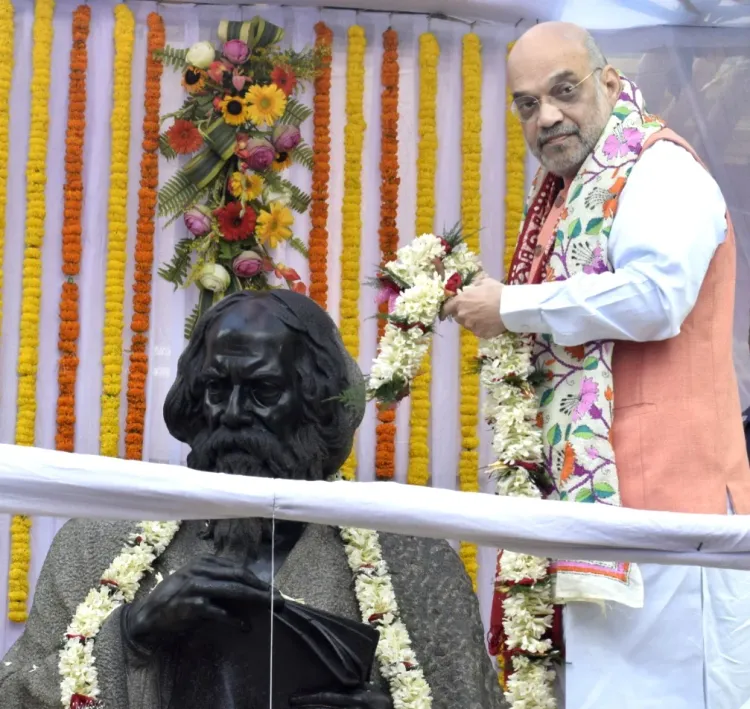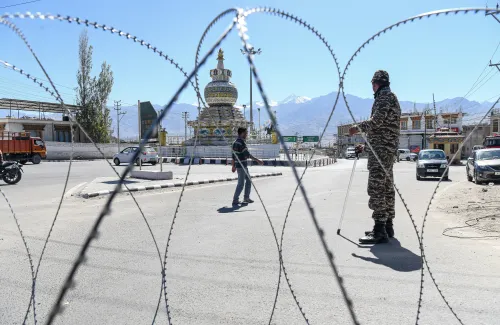How Did Tagore Instill Self-Esteem and Cultural Consciousness?

Synopsis
Key Takeaways
- Rabindranath Tagore was a pivotal figure in shaping India's cultural identity.
- His works instilled a sense of self-esteem and cultural consciousness during the freedom struggle.
- He founded Visva-Bharati University, promoting education rooted in Indian traditions.
- Tagore's legacy includes the national anthems of both India and Bangladesh.
- His influence continues to inspire generations across the globe.
New Delhi, Aug 7 (NationPress) On the occasion of the 84th death anniversary of Rabindranath Tagore, Union Home Minister Amit Shah expressed his deep respect and admiration for the literary giant, highlighting his profound impact on India's cultural and national identity. HM Shah emphasized that Tagore’s eternal creations instilled a sense of self-esteem, cultural consciousness, and the spirit of independence during the nation's freedom struggle.
In a message shared on the social media platform ‘X’, the Union Home Minister stated, “I pay my respectful tributes on the death anniversary of Gurudev Rabindranath Tagore, the eminent litterateur, the composer of the national anthem, and a global champion of Indian philosophy.”
“During the freedom movement, his timeless works charted a new course by enriching the nation with self-esteem, cultural awareness, and a sense of independence. By founding Visva-Bharati University, he bolstered education rooted in the Indian knowledge tradition while gifting the nation its national anthem. Gurudev’s insights will inspire nation-building for generations to come,” HM Shah further added.
Union Minister for Road Transport and Highways, Nitin Gadkari, also honored Tagore, stating, “Remembering the true essence of our National Anthem ‘Jana Gana Mana’, the Indian polymath, Nobel Laureate, and social reformer Gurudev Rabindranath Tagore on his death anniversary.”
Born on May 7, 1861, Tagore left this world on August 7, 1941, at the age of 80 due to severe uraemia and a blocked urinary bladder.
Often referred to as the Bard of Bengal, Tagore was a multifaceted genius— a poet, composer, painter, playwright, and reformer who transformed the cultural and intellectual landscape of the Indian subcontinent.
In 1913, Tagore became the first non-European recipient of the Nobel Prize in Literature for his poetry collection, 'Gitanjali'. His deeply spiritual and lyrical poems brought Indian literature to the forefront globally. He holds the unique honor of composing the national anthems of two nations — India’s 'Jana Gana Mana' and Bangladesh’s 'Amar Shonar Bangla'.
Tagore’s legacy encompasses over 2,000 songs that form the bedrock of the Rabindra Sangeet genre. Throughout his prolific career, he authored eight novels, 84 short stories, countless plays, essays, and thousands of poems that delved into themes of humanity, freedom, and identity.
He renounced his Knighthood, which was bestowed upon him in 1915 by King George V, as a protest against the Jallianwala Bagh massacre in 1919—an act that solidified his position as a moral beacon of resistance.
His connection with Bangladesh remains significant, having created many masterpieces in regions like Shilaidaha, Shahzadpur, and Patishar. In 1921, he founded Visva-Bharati University in Santiniketan, envisioning it as a center of global learning rooted in Indian traditions.
Tagore's lasting influence continues to mold generations, both in India and around the world.









